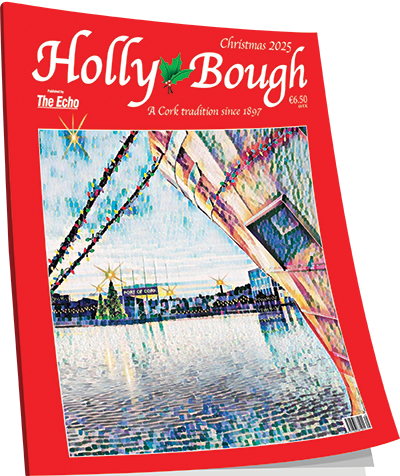Battling to break the mould of local politics

LOCAL politics needs to be focused on bigger issues than just fixing roads, according to Solidarity city councillor Fiona Ryan.
Ms Ryan took over Mick Barry’s seat in the Cork North Central ward last year after he was elected to the Dail, having previously been an activist with his party.
Her only election contest to date was a failed attempt to take a Dáil seat in Cork South Central last year but in two year’s time, she will be charged with retaining her seat in the local elections.
As a relative outsider in Cork's north central ward - she is originally from Dublin and only moved to that area of the city when she became a councillor - Ms Ryan doesn’t have the benefit of a long history in the ward, family connections, or networks like the GAA or community groups. Mr Barry, a fellow Dubliner, ran in several elections before winning the seat, and several more before getting to the Dáil.
While electoral experience isn’t on her side, Ms Ryan believes that people are looking for the type of politics that she and Solidarity - formerly the Anti-Austerity Alliance (AAA) - represent.
"We get a lot of flack about the name changes, but Mick’s politics have always stayed the same. He has only built on his vote as he stayed principled to his politics. Marion O’Sullivan in Cork North West, when she got elected, didn’t have this enormous history. Yes, she was a community activist in Knocknaheeny, but she didn’t have the GAA clubs behind her or big names. She got voted in on the back of her politics. I think that is only going to become more important," she said.
Ms Ryan believes that the status quo of local elections, where candidates of the biggest parties, Fianna Fáil and Fine Gael, can get elected with little regard given to their party is coming to end, as people realise that local government has been stripped of its power.
"I think local politics is going to move away from who’s going to fill the potholes because the reality is that it’s a national decision as to why we can’t afford to fill the potholes. That is the reality."
She believes that she and other politicians should be held to a higher standard than just constituency work or their networks, and judged on the policies of their parties.
"I stand for the same politics that Mick stands for. The same politics that Marion stands for. The same politics that Paul Murphy stands for. If you look at Fianna Fáil, depending on the person, they could be utterly different. They always vote different on the council. You might have one supporting me one day and then giving out to me the next day. There is no idea as to how society should be built.
"It’s not left, it’s not right, even though it is effectively right in government. At the local level it’s, 'you don’t like us, but, sure, vote for the man you know.' That’s the problem."
She said that the decline in services in local government was making people take policies, beliefs, and vision more seriously.
"People aren’t being held to the standards of the political parties they represent and hold up. Because they do hold up their policies and give credibility to Fianna Fáil or Fine Gael. They have been let off the hook because of these ‘local politics for local people’ attitude. I think people are waking up to that. More and more, it’s not about the potholes because we can’t fill the potholes. We can’t get people houses. We can’t invest where we know our communities need it,” she said.
While the party will have to decide how to broach the issue of a second seat - Lil O’Donnell won one in 2014, but amicably left the party earlier this year - Ms Ryan will spend the next two years combining her activism with her position as a councillor to try and force the changes she wants.
She said that her time on the council has made her realise just how important activism is to get things done in Irish politics as local government has been stripped of so much of its power and funding.

For a number of years, the central grants from the Exchequer were cut back, with the local property tax being introduced to cover some of it. This has led to increases in that tax over time, cuts to front line services and less room in the budget for the basic service of the council, with everything from roads to parks and the arts all competing with each other.
As well as removing block grants so the council has less control over its budgets, central government has also used specific grants to get the things it wants done, with the council left with little choice but to do it.
She cites the planned Harley Street Bridge, set to be built between Merchants’ Quay and Patrick’s Quay, as an example of how the central government exerts control over local government even when giving funding.
"There is funding for the bridge but we can’t say that something a bit more crucial is invested in our roads or housing. We have that knowledge, but we have no ability to do it because it’s all coming from central government, who tell us it’s ring-fenced funding and tell us what to do with it," she said.
She also pointed to the restoration of public sector pay rates - something that she and her party welcomed - but said that the government made the decision and then told the local authorities they would have to pay for it out of their budgets for the year, without compensation or assistance.
"It’s austerity through different methods now. Austerity doesn’t come in through budgets anymore. It’s implemented through local authorities. They are passing on the cost of the decisions they make to us without passing on the funding to meet them," she said.
The only solution that she sees to these financial problems is taking them out of City Hall and onto the streets. Later this year, the council will have to prepare its 2018 budget. The council has already eaten through most of its cash reserves, meaning that cuts are almost certainly on the table, as is a rise in the local property tax rate.
However, Ms Ryan said that simply balancing the books is not enough, and councillors need to stop and take a stand.
"Fine Gael councillors will say the same thing. Fianna Fáil councillors will say the same thing. We cannot continue like this. But they are not willing to take a stand. They will do anything to balance a budget.
"But at what point are the cuts too great and too dire, and at what point does the lack of ability to do things become too much. If the budget cannot meet the basic needs of Cork then we should reject it. It’s not tolerable to continue this," she said.
The spectre hanging over every council budget is that if the local authority fails to balance its books, central government can abolish them and appoint an administrator to run the city in its place.
This is a threat that Ms Ryan doesn’t accept. She wants the council to demand more power and more funding, and convince the public to protest and demand it with them, daring the government to appoint an administrator.
"Central government is terrified by protests now. They are watching over their shoulders for anything that might reignite it, whether it’s bin charges or the broadcast charges. They are terrified to put through anything through. Do you think it would be acceptable for the people of Cork for them to say they we are going to sweep aside their elected representatives, install an administrator and continue running the city into the ground? I don’t think so," she said.
While the major protests seen during the water charges debacle might not be seen anymore, Ms Ryan said that people are primed to protest now because they saw the results that can be achieved by it, just as much as they saw the power of social campaigns during the marriage equality protests.
She said that the threat of protests has been enough so far, with the government careful to avoid controversial topics and new charges.
The movements of the last few years have had a big impact on parties like Solidarity, with more people coming along to meetings and rallies and signing up to the party. After the recent Jobstown trials, about 55 people from Cork applied to join the party, along with about 750 more across the country, mainly in Dublin.
Ms Ryan said that she is seeing new faces at meetings, especially younger people like herself - she’s 28 - who weren’t as active as older age groups in the property tax or water charges movements, but have been activated by campaigns like the pro-choice and same-sex marriage movements, and are angry after years of being targeted by austerity politics.
"Our generation has to face this. We will not have conditions as good as our parents had. That’s a fact at this point. We’re probably the most hard-pressed generation, between the cost of living crisis. It’s not just housing, it’s not just rent, it’s motor insurance, it’s the introduction of fees. It’s younger people being vilified and scapegoated time and time again. And eventually, you’ll see that our expectations cannot be met under the current system," she said.
Two of the biggest issues, not just for young people but for all age groups, are the Eighth Amendment and housing. Ms Ryan is often defined by her role as a reproductive rights campaigner. It’s how she first got into politics, and it’s something she is very vocal about.
"Abortion rights was the issue that got me into politics. It’s so clearly a broader issue than just reproductive rights. The only way I see that we will have equality for reproductive rights is under a left government. It requires separation of church and state. It requires investment in healthcare and education. It requires an approach that is based on need and not profit and how much money we have available in the coffers," she said.
However, she wants to be known for more than just that.
"It’s something that I’m proud of, and I will never shirk on my positions. I think I owe the women I have helped in Cork to have that position. I won’t feed into any stigmatisation of women who have had an abortion.
"But, that being said, there is kind of a self-fulfilling prophecy sometimes. I am the only one on the council open to speaking about this issue, therefore I’m the first port of call for the media. I’ll always use my platform to talk about those issues, but housing is by far the biggest issue. I spend 80% of my time on it, and that’s no exaggeration," she said.
Like every councillor, she is inundated with requests for help on housing. Some of those are people trying to get on the social housing list, some are people struggling to some rent, some are facing problems with landlords, and she ends up going through Daft.ie with some of them.
The only solution she sees is major public investment in housing programmes, but she can’t see that happening when local councils are underfunded, and politicians are so tied to private sector solutions.
"It’s like the event centre. This marriage to the idea of public-private partnership, even though the private sector has said they don’t find this viable, which is the reason for the significant delays, is the same in housing. The private sector doesn’t see a financial viability in the market right now. In a city centre in the middle of a housing crisis with enormous rents, you would think that developers would be climbing over themselves to build housing,” she said.
She said that instead of trying to activate the property market through assisting developers or failed initiatives like the help-to-buy scheme, that the state needs to build the houses themselves.
"Whether you are a lone parent who is on welfare, whether you are a young worker who is trying to have a decent, affordable place to live, or whether you’re a young family looking to start out, these options need to be made available to people. They just aren’t there.
"The reason other cities don’t have the same price levels is because they do have public housing options. I visited Austria last year and they have these palaces for the working class. Every block has a childcare centre in it. You have thousands of people in high rise builds that are immaculate, and you don’t have anti-social behaviour, because it’s planned it has mixes of income and is run by the state.
"The state needs to build. It needs to build right. It needs to build with the correct infrastructure in place, which was lacking in the 1970s with this big social housing developments that were left to rot and die," she said.
However, the funding isn’t there for the City Council to do it itself, and the government seems unwilling to budge or private sector solutions. That’s why Cllr Fiona Ryan, ever the activist, believes that people should get out on the streets and demand what they want.







 App?
App?





